Entries Tagged 'Chinois' ↓
November 5th, 2009 — Chinois, People
If I may claim to be of HAKKA descent amongst the Han of China, I am proud to be amongst the 100millions of HAKKA of this world. This is the estimated numbers according to HAKKA researchers.
With the greatest pleasure I re-read the 60 pages booklet produced by Joseph Tsang Man Kin entitled: ‘HAKKA and HUAREN DESTINY Challenge and Response.’ It was a quick reading to arouse in me, my sense of being a HAKKA. I am proud of the values that I have absorbed and am ignited to the need to transmit them.
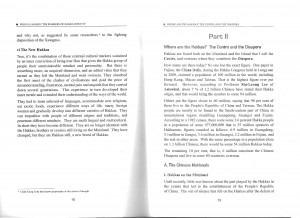
I have a wish to document myself more on HAKKA, the history and their contributions to building the Chinese Nation and their spread in the world. I was reminded in Joseph book that the contribution of HAKKA to the Taipin rebellion is quite known, more recently it is now being let out the contribution of a number of HAKKA’s to the rebuilding of China after the great leap period past the lost of Mao.
The word Hak KAa is itself an oxymore. Could be interpreted as Guest: Home or Foreigner: home.
Has the HAKKAÂ a nomadic gene to be always on the move or is it the continuous search for improvement of his lot that animate him?
The image that comes up to my mind now is: a rolling stone will forcibly become a ball with no shape edges. The roaming to different places, the intermingling with different people, the experiencing different situations forcible transform self into a smooth and versatile body. As such, through centuries of roaming the HAKKA people have been refined in their ways and above all developed versatility and adaptability main traits, at least more than other Hans.
November 4th, 2009 — Chinois, Mauritius
On last Monday, I attended a talk and sharing around Tong Sin at Hua Lien club chaired by Andre Li.
It was a very good idea and the function was well attended by some fifty members of Hua Lien club.
What is Tong Sin?
As indicated on the Hua Lien ‘s invitation, we meant to discuss on sets of values that drive the behaviours of the Chinese in our multi cultural society of Mauritius.
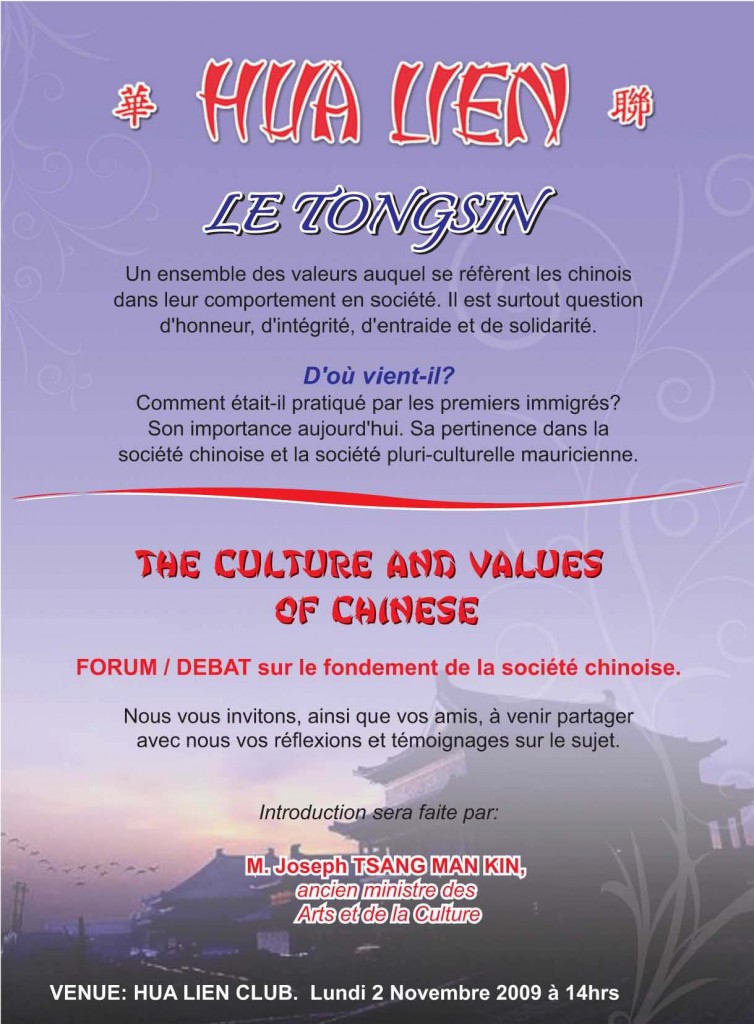
The scope of the subject is so vast.
When I read the invitation notice, I was glad that some frames were given to focus on the theme. However after attending to the wonderful and very pleasant meeting, I came out with much learning from the various speakers and yet still hungry for more learning and hungry for an action plan for myself and a collective action plan. Was it meant to be only an awareness session?
I identified as part of the discussion would be on Culture and Values of the Chinese in Mauritius as practiced by our ancestry. The 2nd November being the day of remembering of the arrival of our forefathers, I thought that it would be an occasion to review the values and behaviours that drove the early settlers to succeed and transmit to them to the community. In the same time bring to light those values and behaviours identified as singular or of highest importance to the Chinese settlers and offer them for integration to the National heritage.
Whilst I argue that all human values may be the same for humanity, each community may well classify their order of preference differently. Respect to the elderly specially Parents, for example is rated amongst the top values in Tong Sin. This might not have the same rating in other communities. Duty to the community supersedes duty to self is very Chinese: yet another example which illustrates the hierarchy of values especially in this present individualistic generating tendency.
It was interesting to deepen my thoughts on the meaning of ‘Culture’ in the context of Chinese culture as the word ‘Tong Sin’ seemed to signify. I quote here the Wikipedia definition:
Culture from  cultura stemming from colere, meaning to cultivate is a term that has different meanings. For example, in 1952, Alfred Kroeber and Clyde Kluckhohn  compiled a list of 164 definitions of “culture” in Culture: A Critical Review of Concepts and Definitions. However, the word “culture” is most commonly used in three basic senses:
- excellence of taste in the  Fine art and Humanities, also known as  High culture
- an integrated pattern of human knowledge, belief, and behavior that depends upon the capacity for symbolic thought and social learning
- the set of shared attitudes, values, goals, and practices that characterizes an institution, organization or group.
When the concept first emerged in eighteenth- and nineteenth-century Europe, it connoted a process of cultivation or improvement, as in  Agriculture  or Horticulture. In the nineteenth century, it came to refer first to the betterment or refinement of the individual, especially through  Education, and then to the fulfillment of  Nationalism. In the mid-nineteenth century, some scientists used the term “culture” to refer to a universal human capacity.
In the twentieth century, “culture” emerged as a concept central to Anthropology, encompassing all human phenomena that are not purely results of human genetics. Specifically, the term “culture” in American anthropology had two meanings: (1) the evolved human capacity to classify and represent experiences with Symbol, and to act imaginatively and creatively; and (2) the distinct ways that people living in different parts of the world classified and represented their experiences, and acted creatively. Following World War II, the term became important, albeit with different meanings, in other disciplines such as Sociology, cultural studies, Organizational psychology and Management studies.
I would single out the two definitions as pertinent to Tong Sin:
- an integrated pattern of human knowledge, belief, and behavior that depends upon the capacity for symbolic thought and social learning
- The set of shared attitudes, values, goals, and practices that characterizes an institution, organization or group.
Roland Tsang was designated to be the scribe for the meeting and I shall be waiting for his report.
For my part I have observed several traits of our ancestors who drove them to succeed in the early days. Based on the history books I have read on the early Chinese settlers, it would appear that they had a high sense of identity. The men would wear their Chinese hats and kept their long pleaded hair to go around the country attempting to sell their wares. Their dress and demeanor identify them and they proudly showed themselves in spite of unpleasant remarks from others. Consciously knowing who they were, where they came from and where they were going gave them an unbeatable mental construct to wage all adversities.
They were 1. Emotionally resilient and 2. Persistent in their sense of duty, thus hard working with a sense of purpose. Â Emotional resilience was their main asset: they have demonstrated positive behavioural adaptation.
This resilience is defined as a dynamic process that individuals exhibit positive behavioural adaptation when they encounter significant adversity or Psychological trauma. Resilience is a two-dimensional construct concerning the exposure of adversity and the positive adjustment outcomes of that adversity. Adversity refers to any risk associated with negative life conditions that are statistically related to adjustment difficulties, such as poverty, or experiences of disasters. Positive adaptation, on the other hand, is considered in a demonstration of manifested behaviour on social competence or success at meeting any particular tasks at a specific life stage.
At the meeting at Hua Lien, I heard one of the participants making a remark on his blurred identity.
The question that I am asking myself now: In the light of the changing environmental factors are we as a community able to reproduce these traits & strength needed for our survival or progress?
How our Tong Sin would nurture our behaviours to contribute to the nation? Would there need to search in our heritage of Tong Sin  traits, values and behaviours to be in congruence with today’s realities of a fast shrinking numbers of our community and cultural metissage? Are we today conscious of the necessity to reconstruct ourselves for the new environment we shall be faced in the coming years?
October 2nd, 2009 — Chinois, Reflexion
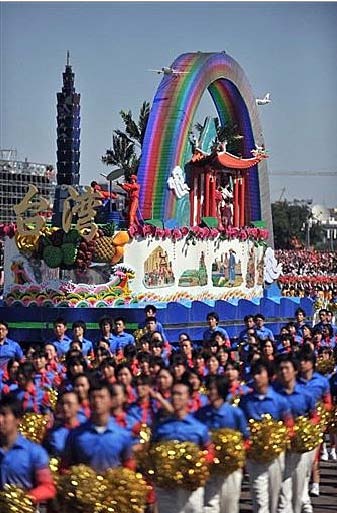
China National day was celebrated yesterday. With a pinch of the heart, I felt sad for not watching the grandiose celebration on CCTV yesterday. Is my attachment with the country of my birth teasing me? This morning I browse through the web to inform me of the celebrations. Over 2 thousand articles there of, are found by google. I selected some of the articles: those who are published by the Chinese organ Xinhua and China Daily, AFP and Reuters, and lastly those published from the Washington Post and the Indian Press. Unfortunately I am not able to read the Russian news correspondent which would have been interesting, in relation to the Sino Russian relationship.
I picked up a comment on the Washington Post which I found telling:
Hainan, China: Why is the media so obsessed with highlighting the military part of the celebration? I just finished watching the evening celebrations and there was zero military, just singing, dancing and fireworks galore. The daytime parade also had thousands of dancers and to be frank, watching it one could easily have missed the parade of military segments. It’s nothing more than when the military bands play in the Rose Parade or flybys by jets during the Fourth of July. The country is trying to have some fun and to celebrate. There was a significant emphasis on peace in symbols during the festivities. Western coverage was extremely biased, even using words like “gaudy” to describe the floats, which I thought were great! Why not an article on how they coordinated the whole thing, simply amazing.
Indeed, as a person for peace, I concur fully with the comments above.
May China for one and other mega powers stop to show their mega military might during their national day celebrations.
I found the time line published by Financial Times to be very useful for a quick high lights of 60 years.
I am reading these days on the Mixed Blooded Tang Dynasty , the China Golden Age!
September 15th, 2009 — Chinois, People
I learned that the release of a film on the Hakka is planned for mid September 2009.
Below is the short synopsis of ‘The Last Clan’. I am looking forward to view the film.
They are a model of socialism. Living as a collective and as equals in a family-based commune. They are the Hakka from the mountainous region of South East China. Their home is a fortress-like structure, called the Tulou, where as many as five hundred family members live together, sharing an ancient way of life. The Tulou is one of the world’s most unique buildings. But as China modernizes and its cities expand, life in the Tulou is slowly disintegrating. As the young move away to find work, only old family members are left to endure the hardships of rural life.
One man chooses to avoid extinction by transforming his Tulou into a popular tourist hot spot. The trend grows and the Hakka are quickly flooded with strangers walking among their homes. They soon realize that tourism is a two-headed monster that brings promises of wealth but threatens to destroy their ancient culture.
I have yet to find out how far Tulou Fukien is from my hometown Mei Xian? I do recall that Fukien Hakka migrated earlier to the South than Mei Xian Hakkas. I had the chance to talking to Fukien Hakka during my past trip to Singapore. I would understand them their language which sounded a bit different from mine.
The characteristics of the houses in Tolou whilst looking different from those typical constructions of Mei Xian have the same purpose: the whole family clan under the same roof, united to ward off the bandits.
September 7th, 2009 — Chinois, Mauritius, People
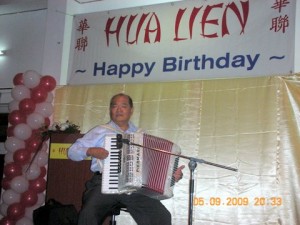
I was delighted to attend the 33th anniversary celebrations of HUALIEN club at Trianon. It crossed my mind that the present President Chan Sun may not have been born when the club was formed or was just a toddler then,and I rejoice that the 33year old organisation is having a new youth with this new generation of active members. Perhaps more significantly, on the celebration day the new website was presented and a master plan for the future development was revealed by the younger generations.
I went through the new website built by Joel Wan Chow Wah, single handedly, and was pleased to see a number of interesting features namely: ‘The Sino Mauritian’ and the ‘Cultural resources’. However I think that the Mission & Aims of HUALIEN club could have been more prominent. The purpose & usefulness of the club can be found in reading through its ‘History’ and story behind the ‘birth of the club’.
I would eagerly wish that the website become an interactive one. Not only could the website be an information diffusing vehicle of the club but also become a place where members can interact with the club and amongst themselves in the virtual world.
Today, I congratulated Joseph Tsang Man Kin for his contribution to the cultural pages shown on the website. Surprise! By returned email, he told me that he did not know that he featured thereon.
All told, I am proud to belong to the club. I have to congratulate the founder members for their vision. My gratitude also goes to all the Past Presidents and their respective committees who through the years have maintain the spirit and have through much struggle built up this wonderful 9 arpents infra-structure which will benefits the future generations.
Long live HUALIEN! Long live the Sino Mauritian Community! Long live Multi- ethnic Mauritius!
September 2nd, 2009 — Chinois, Entrepreneurship, Family stories, learning
Kishore Mahbubani on discussing the position of China in respect of taking world leadership, seems to think that China for the next decades will not take the lead top seat in the affairs of the globe. He quotes the wisdom of Deng Xiaping and thinks that China has still have much grounds to cover in its internal matters to want to spare its energy to dominate world affairs.
Lessons from Mr. Deng Xiaping, who had a lot of political wisdom for his successors to follow. Much of it is captured in the famous 28 characters that Deng used:
1. Lengjing guancha- observe and analyse (developments) calmly;
2. Chenzhuo yingfu- deal (with changes) patiently and confidently;
3. Wenzbu zhenjiao- secure (our own) position;
4. Taoguang yanghui- conceal (our) capabilities and avoid the limelight;
5. Shanyu shouzhou- be good at keeping a low profile;
6. Juebu dangtou- never become a leader;
7.yousuo zuowei- strive to make achievements.
I fancy very much the lessons from Deng in world politics. They could well apply to each individual in our respective sphere of business. I like this sense of humility, discretion and conscious will to keep a low profile- which is very much a Hakka temperament I would like to believe. I could see my Grandfather using these same words.
Our tainted western education would contradict point 5,- be good at keeping a low profile, as we tend to think that we have to be recognised for our worth. When dealing with Chinese businesses in my dates in the Fareast, I could sense the marked difference between a Cantonese or Shanghainese influenced business where boasting on the past successes and a show of power were more important that striving diligently to make achievements with humility.
I recalled the grand welcome my boss and I had by a Hong Kong firm to start discussing cooperation in the 70’s . We were received in a hired Rolls Royce and transported to a posh hotel and entertained lavishly. It was a show of the prosperity that the said firm was enjoying and the power, influence and capacity they commanded. Two days later, realizing that we were still undecided to sign in on their terms, they flatly terminated the talks and did not even show us how to hail a taxi to get our hotel.
August 19th, 2009 — books, Chinois, Entrepreneurship, People
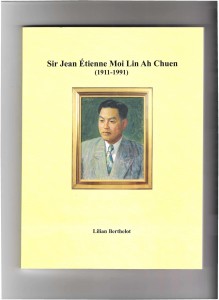
Lilian Berthelot signe un magnifique livre sur Sir Jean Etienne Moi Lin Ah Chuen. Ce document a été présenté lors une réception la semaine dernière le 12 aout 2009, a l’occasion de la transformation de sa demeure au 5 Rue Révérend Lebrun, Rose-Hill en une maison de souvenir pour sa famille et le public.
Par des interviews des différentes personnes qui ont été proches de Sir Jean E. M. L. Ah Chuen, et par le recueil des photographies et autres documents, Lilian Berthelot retrace la riche carrière de ce grand tribun Mauricien qui a marqué l’histoire de Maurice.
Dès ma jeunesse, je connaissais Sir Jean, car il était un ami de la famille. Par ailleurs les commerces de chaque famille étaient contigües sur la Rue La Reine à Port Louis. Nos familles étaient très proches.
Adolescent je fréquentais la rue Révérend Lebrun et m’y trouvait souvent avec le fils Marc et Vincent pour des escapades du Collège St Mary’s. Leur maison de Rose Hill été un havre pour quelques copains de classe pour notre détente quand nous étions accordés du temps libre. Nous passions des bons moments en écoutant et en fredonnant les chansons de Ricky Nelson jouées sur leur gramophone.
J’etais meme present pour le mariage de son fils aine Raymond au Plaza. Ce mariage dans un sens, etait signe d’une evolution de la mentalite. Mariage d’un Hakka a une Cantonnaise.
Ce document vient encore une fois de plus, enrichir la mémoire et histoire de notre nation.
July 13th, 2009 — Chinois, Family stories, learning, People
Last night was a great celebration night for the Oy King Sar Chan Society at the Imperial China Restaurant. Three Chan were praised and given all honors by the Chan community for their distinction in their respective fields following their official recognition by the Nation recently.
What is the purpose of Oy King Sar Chan society? As in many countries where Hakkas have settled, it is customary for the migrants to form benevolent organisation to look after the needs of the poorer members. Solidarity and assistance to the poor are Confucian values that the community of Hakka have always lived amongst the other values. Oy King Sar Chan society which has always been present received a legal status in Mauritius in 1945. This society restricted to members of the Chan clan aims to nurture good relationship amongst the clan members, defend its members and provide social services to the community.
Interestingly enough the Hakkas have always respected the equal rights of the gender: Hakka women were given the nick name of big footed woman, as in the older days the Hakka women supported by their male counter parts refused to have their foot bound . It was traditional for the Han women to bind their feet to keep them small, as a small footed woman was then a sign of distinction.
Of the three Chan’s celebrated last night, the common thread was most importantly the acclamation of these leaders’ perseverance in attaining success through education. This is again a essential Confucian value.
Denise Chan Youn Sen was awarded National recognition for her hard work and dedication as a government civil servant. At a low entry level, Denise joined the service as a temporary accounts clerk; she retired from her service as the Chief finance officer of the ministry of social services.
Yves Chan Kam Lon was awarded by the high distinction of the 2009 US state Alumni a title given to American University student who have outstanding performance in their career. He is now heading the National library and archives of Mauritius, the guardian of the heritage of the country.
As for young Benoit Chan Sui Ko, he won the Economics award Laureate 2008. This will be the start of his career.
The Chan have to be proud of these distinctions. More importantly may the Chinese community continue to contribute to the building of the Mauritian nation.
June 24th, 2009 — books, Chinois
On watching James Fallows’ interview he gave to Harry Kreisler of the University of California in September 2008, I realised how the economy of China is so closely linked to the US. China is caught in a jam with the present financial crisis as the Chinese wealth and reserves are invested in the US. China is locked in and can only bear the brunt.
I also liked and fully subscribed to James Fallows’ views, who is of opinion that the Chinese are completely different in mentality in comparison to Japanese. Chinese are more individualistic. The former will not toe the line blind folded as would the Japanese.
James is an accomplished journalist and author. It was very interesting to hear the opinion of an American who was an advisor of Jimmy Carter, and now living in China, giving his views on China.
I knew that the US were overspending and could do so, mainly because China and other countries were having their reserves kept in US in dollars and US securities. The reckoning is now here, yet countries like China just cannot get out of the system without hurting themselves. Moving away from the US will cause further drop of the securities and result in higher losses.
The explanation of James Fallows was expressed in a clear and plain understandable language. I was immediately prompted to read more from James Fallows. His latest comments on the position of China, Iran written on the 22 June is very interesting. Truly, since the last couple of days watching the world news, I have to admit that somehow, the western media is framing our mind on the present Iran situation. Should we not take the Chinese stance on this issue instead of interfering in their domestic cooking?
James Fallows article in the Atlantic Monthly: Iran in China
“It is worth remembering that the elements of the Iranian story that give it such drama and importance in much of the world are less automatically resonant in China.â€
June 3rd, 2009 — Chinois, learning
Tomorrow, the 4th June will be the twenty years since the Tiananmen Square Massacre occurred according to the western world press. China recorded the happenings of this incident as the June four incident. Is it a euphemism on the part of the Chinese? Or is it the naming of this event according to one’s view and reading?
Twenty years since the much reported incident with hind sight view what can we deduct? The proponents and defenders of Human rights, the western world press definitely has a different view of the killing of unarmed student protesters by the Chinese army to the reading of the Chinese authorities who then ordered the end of the protest.
What were the reading of the Chinese government of the situation of this protest and the impact of it on the state?
I read with keen interest the back ground atmosphere leading to the killing of these protesting students and I invite you to do so, on Wikipedia.
The Party elders believed that lengthy demonstrations were a threat to the stability of the country. The pressure on the Chinese from within the country as well as from other nations was mounting to become unbearable by the authorities.
How many persons were killed? 5000 or 7000 persons were eliminated according to different sources.
This 4th June Tiananmen Square event has certainly impacted the course of history in China. Foreign loans to China were suspended and tourism to China decreased and embargo on arms were reactivated. The Chinese economic reform as planned by Deng Xiaoping was delayed.
I read through this event the fundamental cultural difference between the intrinsic values of the western and Chinese. In the west, the individual rights are primary whilst in China the nation’s rights override all. What is good for the community is good for all.
Tiananmen June 4th was a mere incident in the very long history of China; it may well be one of the many massacres perpetrated. The killed individuals were collaborators of the history.
Our beliefs shape our vision?




